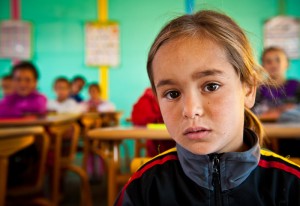Womens e-news
by Juliet S. Sorensen
The White House announcement, to great fanfare, of nearly $100 million in U.S. aid via the Millennium Challenge Corporation to support school attendance by Moroccan girls is a necessary but insufficient step.
In southeastern Morocco, where I served from 1995 until 1997 as a Peace Corps volunteer, it was estimated at the time that 85 percent of school-age girls were not in school. That figure was echoed by the first lady’s aides. Only 36 percent of girls in rural Morocco enroll in secondary school. The female adult literacy rate in Morocco is a mere 58 percent, according to the World Bank.
Why does a country that is just nine miles from Europe suffer from such dismal education indicators? The reasons are myriad. In isolated areas, parents keep girls at home to mind younger siblings; do housework; and marry as early as 12, notwithstanding a minimum legal age of 18. Some parents keep girls at home because they cannot see the utility of education in an agrarian economy.
In Berber areas, parents keep girls at home because they do not speak Arabic, the language of instruction, and all too often the teacher supplied by the Moroccan Ministry of Education does not speak Berber.
America’s $100 million must not go towards constructing schools. There are elementary schools throughout the country, even in remote villages.
Instead, the money should be invested in a thoughtful, deliberate campaign to boost the status of girls in Moroccan communities. Girls’ education is often regarded as useless or even harmful. Ideally, this U.S. investment will help local leaders see how girls’ education is not only fuel for economic growth, it is an essential human right.
The Let Girls Learn Program, in which Peace Corps volunteers and local leaders work to advance girls’ education and empowerment, uses this approach. But the first lady’s program will not be the only one administering this money.
To the extent that U.S. money is spent on construction projects, I hope it will be applied to the kinds of construction projects that improve access to secondary education. USAID’s commitment of $400,000 to construct girls’ dormitories at secondary schools, for instance, is well spent, since many secondary schools are in towns that are too far to access when transport from the village is uncertain and roads are poor.
The promised aid should also support the Ministry of Education in improving a curriculum that is notoriously poor, producing high school graduates that are ill-equipped to excel in university or a profession.
Cautionary Tale
I learned much about sustainable development as a Peace Corps volunteer, but one particular experience serves as a cautionary tale to reformers who wish to effect change.
In 1996, a generous dentist from Minnesota sent 700 toothbrushes to a fellow volunteer. He and I split the haul and, with the help of the Near East Foundation, I devised a dental hygiene campaign. I took it on the road, riding my Peace Corps-supplied mountain bike to every schoolhouse I could reach. With colorful illustrations, I taught each class about the dangers of tooth decay, showed them how to brush and passed out toothbrushes. I was optimistic that my lessons were a success.
Not so fast.
One night, I heard a knock on the door of my mud house. I opened it to find two small children. I recognized them as attending the school I had visited with my toothbrushes and lesson plan just two days earlier. They asked me for more toothbrushes. “But why?” I asked them. They explained their parents, unaware of the dental hygiene campaign, had seen a different use for the brushes: cleaning out the hooves of their goats.
I realized in that moment that I, from my cultural distance, had omitted an obvious point: toothbrushes are for the exclusive use of one person, not family members and not farm animals. I should have brought my lesson not only to classrooms, but also to homes. And I should have found a local partner with whom to present this material and fill in any possible cultural gaps.
As the toothbrush goes, so goes the education of a nation’s girls: it must be of high quality, accompanied by targeted, culturally appropriate outreach to parents and communities and improved access. Money alone will not get us there.
ABOUT JULIET S. SORENSEN

Juliet S. Sorensen is a professor at Northwestern Law School, where she teaches health and human rights and is a director of the Northwestern Access to Health Project.







